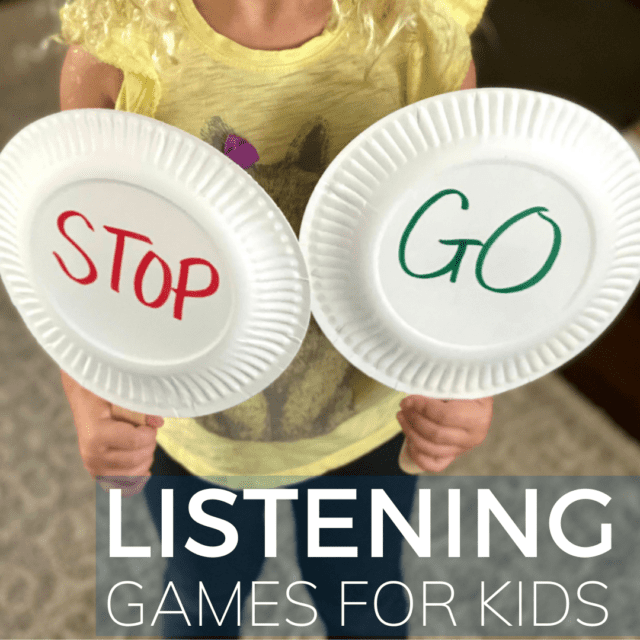
How can I prepare my child for kindergarten? These listening games are a fun way to start working on kindergarten readiness!
When it comes to preparing for kindergarten, kids don't just need to know their ABCs and how to write their name. Social emotional skills are crucial... and guess what? You've probably already been working on these skills long before now!
Why are social emotional skills important for kindergarten readiness?
The National Association for the Education of Young Children (NAEYC) says "Children's social and emotional health affects their overall development and learning. Research indicates that children who are mentally healthy tend to be happier, show greater motivation to learn, have a more positive attitude toward school, more eagerly participate in class activities, and demonstrate higher academic performance than less mentally healthy peers (Hyson 2004; Kostelnik et al. 2015)."
Being able to develop and maintain relationships is an important skill for kids to learn. Part of being a good friend and having a positive relationship with others (friends, teachers, other adults) comes down to simple skills like listening and following directions.
Often parents get hung up on academic skills as they are preparing their kids for kindergarten, but social emotional skills are just as important and make a big impact as your child gets started in kindergarten.
One important area to practice is helping your child learn how to LISTEN and FOLLOW DIRECTIONS. Both from adults and other kids (siblings/peers).
Developing listening skills is important for several reasons, in addition to being able to function in a classroom:
- Listening helps your child improve their own language and communication skills as they listen and learn from others.
- Listening helps your child develop their own literacy and comprehension skills.
- Listening skills help kids develop better social interactions. As kids interact with their friends, they want to start to learn and remember information about their friends to help build their relationships. Their friends also like when they listen to them and the relationship is reciprocal.
Here are 12 Simple Listening Games (and Songs) for Kindergarten Readiness
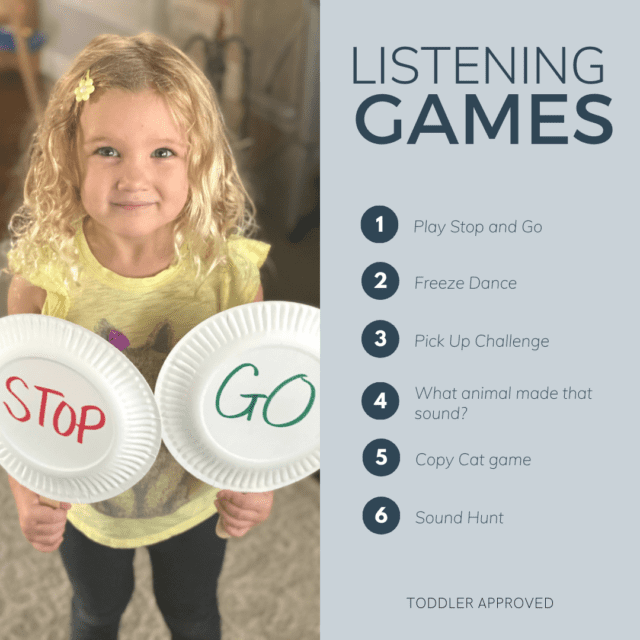
We love to work on listening skills and following directions by playing simple games! Using games helps create positivity around the teaching these skills and games motivate kids to actually practice too!
Here are a few listening games that you could try this week with your kids:
- Mother May I - You can play this game with 2-3 people. One person takes a turn being "Mother" and the other kids will do what they tell them to do.
- Red Light Green Light- This is a fun song version of the game. You can also see how to make our Paper Plate Stop & Go Game here.
- Simon Says- (fun song version) My kids love playing along with this!
- Play telephone- Sit in a circle and have one person tell the person next to them a word or short phrase by whispering it into their ear. Pass the message along to each person in the circle until it gets back to the first person. See if the right message made it all the way around!
- Freeze Dance- Any freeze dance song is great, but we love the Kiboomers freeze dance song! It's always a hit at our house!
- Go on a Sound Hunt- Make your own sound scavenger hunt and then get outside and see if you can hear all the sounds.
- Animal sound game- Make an animal sound, have your child listen and guess which animal makes the sound! Repeat! You can even take turns and give them a turn.
- Copy Cat game- tap, clap, stomp, and have your child try to copy you! See if they can follow all of the things you did!
- Guess the instrument- Play an instrument sound and have your child try and guess the sound. This takes some careful listening!
In addition to games, you can practice following directions and listening during everyday activities:
- Giving your child a challenge. I'm going to ask you to do 2-3 things, like pick up 3 things. Let's see if you can do all of them before my timer goes off. Or just see if they can remember all three things in a row!
- Reading together! As you read, stop and occasionally ask your child questions about the story.
- Establishing simple routines and practicing them- 1) Put your bowl in the sink after you eat, 2) Put your clothes in the hamper after you change into your pjs 3) Pick up 5 toys before bed. Learning to follow simple routines at home will help your child when they are in a classroom and need to learn some of the class routines.
Do you have any other fun ways you practice following directions and listening during everyday activities at your house? Share them below!
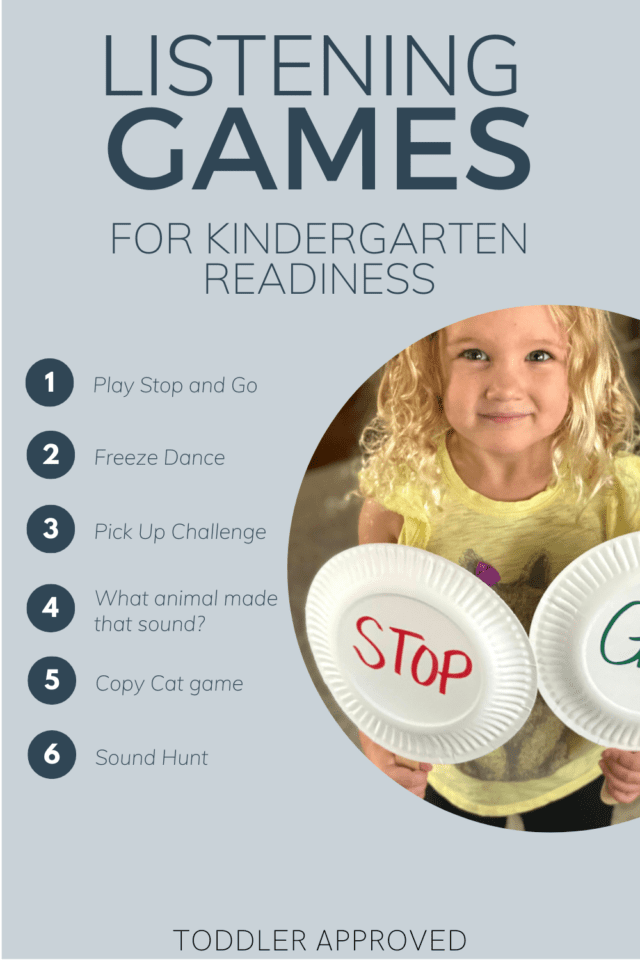




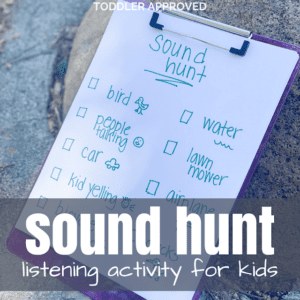
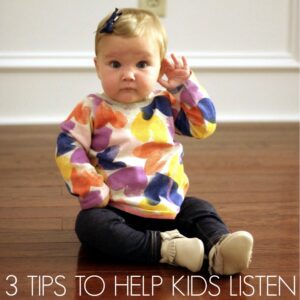
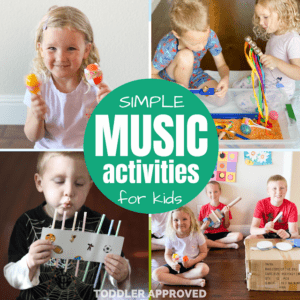
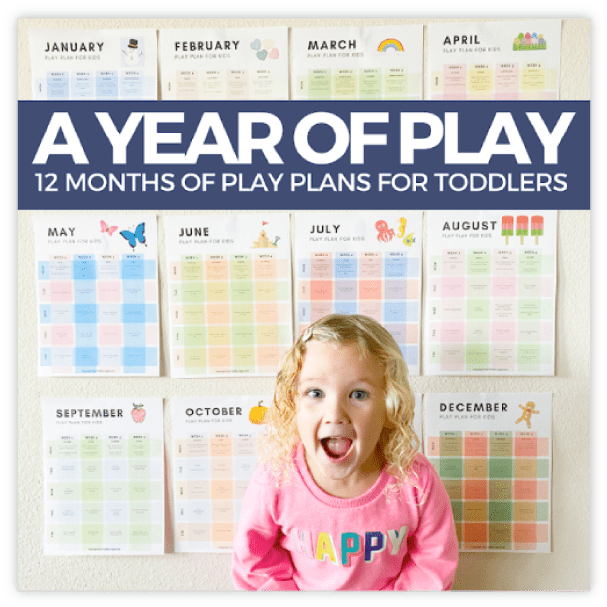

These are some really great suggestions and the games seem so much fun. It would definitely help kids to enhance their skills. Thanks for sharing, it’s very useful!